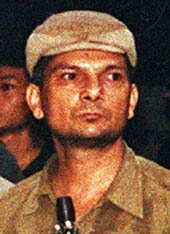Nepal: Maoist rebel leader agrees to head peace talks
The announcement came two days after Prachanda, the communist rebel chief, named three negotiators to represent his group. However, on Thursday evening, Deputy Prime Minister Khadga Prasad Oli said in an interview with The Associated Press that talks would have been expedited if Prachanda had personally headed the discussions.

Oli also announced that Nepal is likely to have a new constitution by November 2007. That would meet a key demand of communist rebels who joined political parties in a campaign that forced King Gyanendra to relinquish power, although the rebels want an interim constitution immediately.
Yadav said the three-member team would still try to "create a conducive environment." He did not elaborate on whether their task had now changed, and when Prachanda planned to hold talks.
Suresh Chalise, the prime minister's spokesman, said he was aware of Prachanda's decision and was awaiting more details.
The government pressed on with action against the principal actors of the king's ousted regime. The king's home and information ministers were detained, a Home Ministry official said on condition of anonymity because he is not authorized to speak to the media.
On Thursday, Oli made the first public statement on behalf of the new government asking Prachanda to personally join the talks, saying it would "have been better because then and there the talks would be finalized."
Oli also pledged government security for Prachanda, who has kept a low profile for more than a decade.
"If they ask the government, (the) government will provide security for them," he said, adding that Prachanda's absence would likely delay bringing an end to the decade-old insurgency, which has killed more than 13,000 people since 1996.
Oli also offered the first timeline for plans to rewrite the constitution, saying "a constituent assembly within 12 months, and within 18 months a constitution will be formulated. This is my calculation."
He said the king's role in government would be decided by the assembly, which will be chosen by the people.
The United Nations has offered help in planning and conducting elections to the constituent assembly, and in writing the constitution, the U.N. chief in Nepal said.
After weeks of anti-monarchy protests, Gyanendra reinstated Parliament, which reconvened April 28, and appointed a prime minister selected by the political parties, according ot the AP.
Subscribe to Pravda.Ru Telegram channel, Facebook, RSS!

